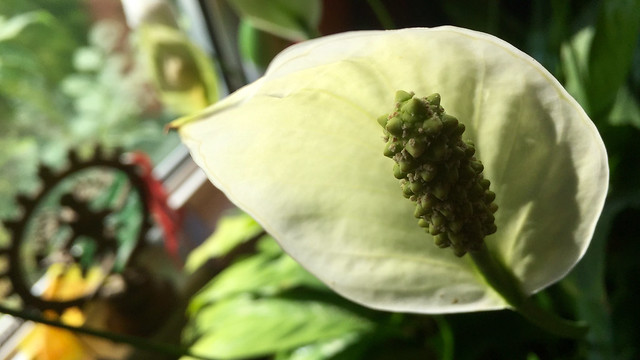|

Peace Lily & Dancing Shiva
* * *
Taigu Ryokan, Zen (Japan, 1785-1831)
Down in the village
the din of
flute and drum,
here deep in the mountain
everywhere the sound of the pines.
* * *
Ryokan became a Zen Buddhist monk at age 18, after being a sensuous youth. After excelling in monastic life, he was offered the position of head of the monastery, following his Teacher, Kokusen. He declined the offer and the title Master—used of Zen teachers.
Ryokan chose to move about the countryside as a hermit begging for a decade. John Stevens, in Dewdrops on a Lotus Leaf: Zen Poems of Ryokan, summarizes his way of life - In his early forties, Ryōkan drifted back to his native place, and he remained there the rest of his days, living quietly in mountain hermitages. He supported himself by begging, sharing his food with birds and beasts, and spent his time doing Zen meditation, gazing at the moon, playing games with the local children and geisha, visiting friends, drinking rice wine with farmers, dancing at festivals, and composing poems brushed in exquisite calligraphy.
Ryokan refused to criticize others or listen to others do so. During his hermitage days, an area lord invited to built him a temple and Ryokan be the head of it. The offer was not accepted. He eventually moved into a hermitage at the foot of Mt. Kugami. In his last days, he lived in a patron's dwelling. There, he fell in love with a nun. She remained at his side the rest of his days, until his passing on at age 73.
* * *
In the above poem, we see a contrast between two environments with their contrasting "din" and "sound of the pines." The poem speaks of Ryokan's choice for the subtle, quiet way, a life of simplicity rather than the life of much and noise.
The word "din" is related to a Norse word, dynja, "come rumbling down." That is what we hear in so many places. We hear rumble. Rumbling has become something most people cannot get enough of.
Have you walked in the woods and heard the sound of a breeze blowing through the trees? Having come up far from a town, in a farming community, I recall that sound and how soothing it is. Have you heard the hum of silence on a quiet, dark night?
Still, like Ryokan, we can only enjoy quiet, soothing sounds by receiving silence within ourselves. Exposed to too much "din," we lose our receptivity to such subtlety and forfeit the comfort and connection with Nature it offers us.
Unlike Ryokan, we may not be able to live away from the "village" and its "din." Yet, we can choose quiet times and places in our daily lives to nurture quietude. If we do not do this, the "din" outside becomes "din" inside.
By nurturing time in quiet, we cultivate an inner hush. Amid a city, we can carry with us the "deep in the mountain."
* * *
*(C) Brian K. Wilcox, 2024. Permission is given to use photographs and writings with credit given to the copyright owner.
*Brian's book is An Ache for Union: Poems on Oneness with God through Love. The book is a collection of poems Brian wrote based on wisdom traditions, predominantly Christian, Buddhist, and Sufi, with extensive notes on the poetry's teachings and imagery.
*Ryokan poem at allpoetry.com . Original source unknown.
|





